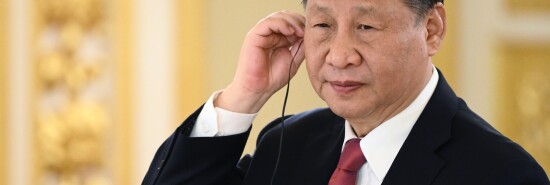
GOP presidential hopefuls should pay close attention to European leaders’ visits to Beijing
Tom Rogan
Video Embed
Following in German Chancellor Olaf Scholz’s ignominious footsteps, the leaders of Spain and France and the president of the European Commission are set to visit Beijing separately in the coming weeks. As the South China Morning Post notes, new trade agreements are at the top of their China to-do lists.
These visits should remind us of a major flaw in the Biden administration’s foreign policy — namely, its comfortable tolerance of major European allies that prioritize trade with China before all other concerns, even the most important of issues, such as human rights, intellectual property, and international security. This European stance undermines U.S. efforts to restrain China as it works to dismantle the U.S.-led democratic international order. To be sure, some European nations, such as the Baltic States and the Netherlands (the United Kingdom is an open case), deserve American gratitude for making painful choices to support U.S. security concerns. Still, so deferential are many European leaders to China that they are unwilling even to pressure China to use its influence with Russia to end the invasion of Ukraine.
This situation should be intolerable from a U.S. policymaker point of view.
Consider, after all, the vast economic and security benefits Europe has gained from its historic alliance with America. Yes, the United States has gained much from that alliance also. But alongside privileged trading relationships, the U.S. military security umbrella has been a de facto and very lucrative subsidy for Europe’s defense. Shared democratic security should matter to European leaders. So also should the fact that Europe’s great economic development since 1945 has only been made possible by the very same U.S-led democratic international order that Xi now seeks to dismantle.
To be fair, the Biden administration has a mixed record on China policy. Its multinational restrictions on chip exports and agreement of new U.S. military basing rights in the Philippines are the key positives. The administration’s suspension of the Justice Department’s China Initiative and inadequate restructuring of the U.S. military are its key negatives. But the Biden administration is wrong to give European allies a free pass on their undermining of U.S. interests. Those seeking to replace President Joe Biden should take a different approach. The next president must assess allies and associated diplomatic, economic, and security engagements with a laser-focused view to how they support U.S. interests with regards to China.
Do not misunderstand me. This is not a call to MAGA-style foreign policy transactionalism, the benefits of which are inevitably degraded by the insults and unreliability carried alongside. Nor is it a call to suspend NATO, which continues to serve U.S. interests (although the U.S. should prioritize NATO members that take burden sharing seriously). Instead, it is a call to a statecraft that adopts a more honest view of U.S. interests and needs. But anyone running to replace Biden should see that such a call is urgently needed.
It is utterly absurd, for example, that Spain should retain a significant U.S. military basing posture, always valuable to local economies, even though it is one of NATO’s very lowest-ranking members regarding defense burden sharing. Now the U.S. is supposed to say, “A-OK, Pedro,” as the Spanish prime minister kowtows to our preeminent adversary? So also should presidential contenders ask why French President Emmanuel Macron receives Biden’s hosting for state visits even as he puts China before France’s oldest ally. The AUKUS submarine deal offers Macron some legitimate grievances, and his recent defense pledges deserve praise. That said, Macron’s China policy looks like a clandestine coup de main against American interests.
Top line: European democracies have the right to pursue whatever foreign policy they deem in their national interest. But America has that same right and, vis-a-vis China’s challenge, an overriding need to act in kind. If European allies want to put China first, the next president should adjust U.S. policy in recognition of their diminished commitment to the U.S. alliance.
